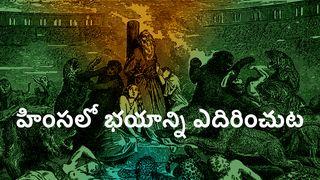Learning to Trust God in the Psalmsనమూనా

Psalm 63: Are You Clingy?
“My soul clings to you; your right hand upholds me.”
Psalm 63:8 (NIV84)
In a few instances, such as with this Psalm, David provides a title. When he does, the title is significant to the content. The title of this Psalm is “A Psalm of David. When he was in the desert of Judah.” You will find this title written in your Bible at the beginning of the Psalm.
What was David, the King of Israel, doing in the desert of Judah? What happened that caused him to flee his beautiful home in Jerusalem? Answer: His treasonous adult son Absalom had staged a coup and was hunting for him. Absalom’s plan to overthrow his father was strategic and attracted many who would help him. Ultimately, he intended to kill his father and become the King. You can read the story in 2 Samuel 15 and 16. David wrote this Psalm in a time of reflection while he was hiding in the desert of Judah.
Can you imagine the heartache and betrayal David must have felt? Can heartache sink any deeper than a scenario of betrayal that involves your family? Sadly, as betrayal was common in David’s era, it is common in ours. Betrayal is rarely between strangers. It is almost always between family, friends, neighbors, and coworkers. How did David mentally, emotionally, and spiritually process the brutality and unfairness of his son’s brutal betrayal? Can we learn from David’s experience?
David did not have many options for resolving the situation. He was forced to make decisions he never expected he would have to consider. Likewise, you may not have many options to resolve your situation and must make decisions you never thought you would have to make. David shared in this Psalm what helped him process his situation and aided him through the tough decisions.
He quickly realized his situation was bigger than his ability to resolve it. Sadly, he had to accept the reality of his son’s betrayal. Wisely, he knew how to do what he had done in previous difficult situations. He chose to be clingy. In his heartache, he wrote, “My soul clings to you…” The Hebrew word for cling includes the ideas of sticking close to another, cleaving or uniting with another, and being joined fast to another. The betrayal he experienced with his son drove him to seek the presence of his Heavenly Father.
As you read the entire Psalm, you will notice that David does not say much about his living conditions or the consequences that have been forced upon him. Because of the title he provided for this Psalm, we know he went from sleeping in a palace to sleeping in the desert. Everything had changed. Life had become harder and more troublesome. Yet, he does not elaborate on his circumstances, internal pain, or uncertainty. Only two of the eleven verses focus on the negative aspect of his situation. The other nine verses contain the keys to surviving and thriving when life forces us into desert places.
Verses one through six reveal that his greatest loss was not his palace, his nice bed, or the comforts of being a king. His greatest loss was his ability to know God in the way he once did in the sanctuary in Jerusalem. Therefore, he decided to seek God and know His presence in his new and undeserved circumstances. He did not allow the unfairness of his situation to rob him of more than it could. In the Desert of Judah, he wrote, “My soul will be satisfied as with the richest of foods; with singing lips my mouth will praise you.” He purposed to know the empowering presence of the Lord on his desert bed as much as he did on his palace bed.
David was looking up, not down. He was focusing on the Lord, not Absalom. He was exercising his faith, not anger or bitterness. When he says your right hand upholds me, he is referring to the internal strength he is experiencing to live another day. He is acknowledging that the Lord has deposited in him the ability to believe and have hope for a different outcome. While little of the external circumstances had changed, his internal perspective had. As he clung to the Lord, he was strengthened to see the future differently from the reality that was present in front of him. His choice to cling to God strengthened his trust in God’s sovereignty.
The upholding hand of God lifts our faith, our hope, and our belief beyond our current situation. He steadies our souls in the storm. This Psalm is a testament to the fact that even in the worst of situations, we can experience the assuring and sovereign presence of the Lord. While we may not know the outcome of our painful situation, we can know the assuring presence of the One who does. When we cling to Him, we cling to the presence of the One who can help us through the tough times. When we embrace Him, He upholds us. When we are in our personal Desert of Judah situation, let us do as David did: seek, thirst, long, glorify, praise, lift up our hands, sing, remember, and cling to the Lord. While we may need to isolate ourselves from our betrayer, we must never isolate ourselves from the presence of the Lord.
Therefore, if you are going to be clingy with anyone, cling to the Lord!
వాక్యము
ఈ ప్రణాళిక గురించి

When we trust in the Lord, especially when we are surrounded by challenging circumstances, something amazing happens. A divine exchange occurs. What could not be perceived or experienced before that moment is now available to us. We see differently. We act differently. Emotionally, mentally, and spiritually, we are changed. Because of the Lord in us and our trust in Him, we will endure. This plan was created from reflections on the Psalms by Pastor Berry Johnston.
More







